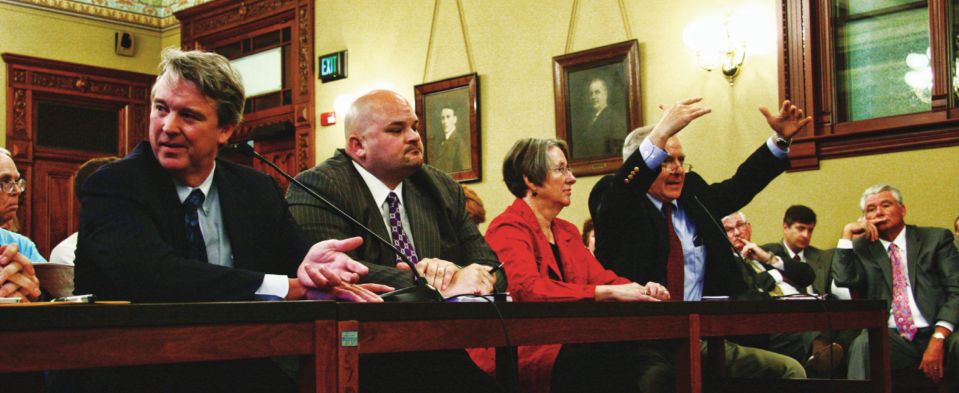
Fracking bill draws harsh criticism in Statehouse
Protestors claim deceit over controversial drilling process
ENVIRONMENT | Patrick Yeagle
In the formerly quiet towns of western North Dakota, there are new strangers arriving every day. New housing is being erected at a breakneck pace, and newfound wealth is flowing quickly into the rolling hills because of the wealth flowing out of them.
Hydraulic fracturing of the Bakken Shale rock formation has created an oil rush that demands plenty of workers and water to free up the trapped crude. One resident, who works at a hotel in a small western oil town, says even fast food workers are making upwards of $15 per hour because oil jobs are so plentiful and lucrative.
Speaking before a packed Illinois House legislative committee on Tuesday, proponents of a bill to regulate hydraulic fracturing told lawmakers that the process would create badly needed jobs in southern Illinois. If they’re right, Illinois could see the same type of boom as North Dakota. But if the opponents of the bill are right, fracking could also bring a more undesirable transformation.
Often referred to as “fracking,” hydraulic fracturing consists of pumping millions of gallons of water and chemicals underground to fracture shale rock and free up trapped pockets of oil or natural gas. It’s different from older fracturing techniques in that modern fracking uses far more fluid and affects a far larger underground area.
Currently, the process is mostly unregulated in Illinois, but oil and gas drillers are hesitant to begin fracking until a regulatory framework is in place. While the petroleum industry says fracking could allow the United States to overtake Saudi Arabia as the world’s number one supplier of oil and natural gas, some environmentalists claim the process pollutes the environment and wastes water.
Rep. John Bradley, D-Marion, spoke forcefully on Tuesday at a legislative committee in favor of the fracking legislation, Senate Bill 1715, which he sponsors in the House. Bradley decried accusations from some environmental groups that the bill caters to the natural gas industry at the expense of the environment.
“This is the result of an open process, which has involved bipartisan, bicameral negotiation for months on end,” Bradley said, recounting a list of governmental, industry and environmental groups involved in the negotiations. He said the first priority in striking a deal was protecting groundwater through the strongest regulations in the U.S. “For anybody to say that the intent of any of the legislators working in good faith … was anything besides that is disingenuous.”
But Bradley’s insistence didn’t lessen the fiery criticism from protestors who packed the committee room, many wearing large stickers that commanded “Ban Fracking Now.”
Josh Fox, the Emmy-winning creator of the anti-fracking documentary films Gasland and Gasland II, told lawmakers he had interviewed thousands of people whose health and land were negatively affected by fracking activities. He accused Bradley and other fracking proponents of whitewashing potential damage of fracking.
“I would like to submit to you the possibility that the people who are sitting next to me are speaking in the same deceitful language as the natural gas industry,” Fox said. “I’ve been asked to come here to report on this as an investigator. … I have seen this industry run rampant over America, over Americans. I have seen this industry run rampant over peoples’ human and civil rights.”
Dr. Sandra Steingraber, a biologist and author of the book Living Downstream, testified at the hearing that the long-term effects of modern fracking on human health and the environment aren’t understood yet.
“It turns communities into industrial zones, and until and unless you understand and quantify those costs, you cannot claim that fracking Illinois will provide net economic benefits,” Steingraber said. She dismissed Bradley’s assertion that Illinois’ proposed fracking regulation is a national model.
“Yes, it is a model, but it is a model for unethical behavior, it is a model for antiscientific decision making, and it is a model for how to completely disrespect democracy,” Steingraber said.
Bradley shook his head incredulously several times during the opponents’ testimony.
The committee voted unanimously to send Bradley’s fracking bill to the full House, prompting angry chants of “shame, shame, shame” from protestors.
If the bill passes the House, the Senate will get a chance to approve or reject changes made by the House. Gov. Pat Quinn issued a press release Tuesday praising the bill and indicating he would sign it.
Steingraber said opponents of fracking would fight the bill with “Churchillian resolve” every step of the way, even engaging in civil disobedience if necessary. Steingraber, who is originally from near Peoria, was arrested in April for illegally blocking a natural gas company from accessing a site in New York state, where she now lives.
“Making our case before our elected officials is only one part of the democratic process,” Steingraber said. “The people of Illinois have stood up in various ways throughout history to fight injustice, and that will happen again.”
Contact Patrick Yeagle at [email protected].